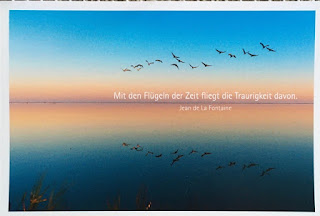I am not sure that I entirely agree with Jean de La Fontaine, when he wrote, "With the wings of time, sadness flies away."
“I am only one, but still I am one.
I cannot do everything, but still I can do something.
And because I cannot do everything,
I will not refuse to do the something I can do.”
Edward Everett Hale
Wednesday, 28 October 2020
Time and Sadness
Friday, 23 October 2020
Step by Step
Friday, 16 October 2020
The Power of Dreams and of the Mind
A lovely inspirational quote this week, by Wilma Rudolph: "Never underestimate the power of dreams and the power of the mind. The potential for greatness lives in all of us."
Friday, 9 October 2020
The Difference between Choosing Isolation and Being Forced Into It
The words of Seneca, the Roman philosopher who lived in the first century CE, really resonate with me. He wrote, "You have to combine and alternate times of solitude and times of sociability. The one awakens in us a longing for people, the other a longing for ourselves" (or, I guess, our own company).
Friday, 2 October 2020
A Love of Mystery
The Unitarian and Transcendentalist writer, Ralph Waldo Emerson, wrote, "I prefer to live in a world surrounded by mysteries, rather than in one so small, that my mind can comprehend it."
And one of my best-loved non-fiction authors, Brené Brown, wrote in my favourite book of hers, The Gifts of Imperfection, that she initially believed that "faith meant 'there's a reason for everything'" Then she discovered that "faith meant something else to [the men and women living the Wholehearted journey]." Which led her to redefine faith, based on the responses she was hearing from them, "Faith is a place of mystery, where we find the courage to believe in what we cannot see and the strength to let go of our fear of uncertainty."
I believe that our lives are richer if we can find that courage, and love the mystery, the sacred not-knowing of life. Theologican Frederick Buechner wrote, "Faith is better understood as a verb rather than as a noun, as a process rather than a possession. It is on-again-off-again, rather than once-and-for-all. Faith is about not being sure where you're going, but going anyway. And theologian Paul Tillich wrote, "Doubt isn't the opposite of faith; it is an element of faith."
Unitarians have a great capacity for mystery, for "living in the questions", as Rainer Maria Rilke put it. For example, we can never prove that God exists (or doesn't exist). But we can have faith that He (or She or It) does. And live our lives as though we believed it. Which I think is what Emerson meant when he said he preferred to "live in a world surrounded by mysteries."
Unitarian faith often includes a healthy dollop of doubt - not taking anything for graned, not accepting anything without questioning it first. We have always been in the habit of questioning beliefs and cherishing doubts. I would guess that many of us came to Unitarianism precisely by that path - by starting to question some of the beliefs we grew up with. In my case, I realised that I could not accept the divinity of Jesus as the unique Son of God, and also struggled with the idea that his death on the cross somehow put me back into right relationship with God. But to quote Jan Carlsson-Bull, Unitarians have learned to "hold faith and doubt in reverent balance".
Which means actively searching for and working out what gives your life meaning, putting your whole heart and mind and soul into it, and yet at the same time, totally respecting the right of every other member of your Unitarian community to disagree with you. It can be a tough call, sometimes.
Holding faith and doubt in reverent balance, living and loving in mystery, also means being open to new ideas, from wherever they come. Unitarianism at its best is a wonderfully open way of approaching life and religion, based on an appeal to reason, conscience and our own lived experience. It is an ongoing process - you don't just experience a one-off conversion and then rest on those fixed beliefs for the rest of your life; every Unitarian has a duty to approach all new ideas and concepts reverently and critically, and take from them what speaks to our own reason and conscience, and what makes sense in the context of our own lived experience, in order to live out our lives in the best and truest way we can, making room for mystery, for uncertainty, along the way





